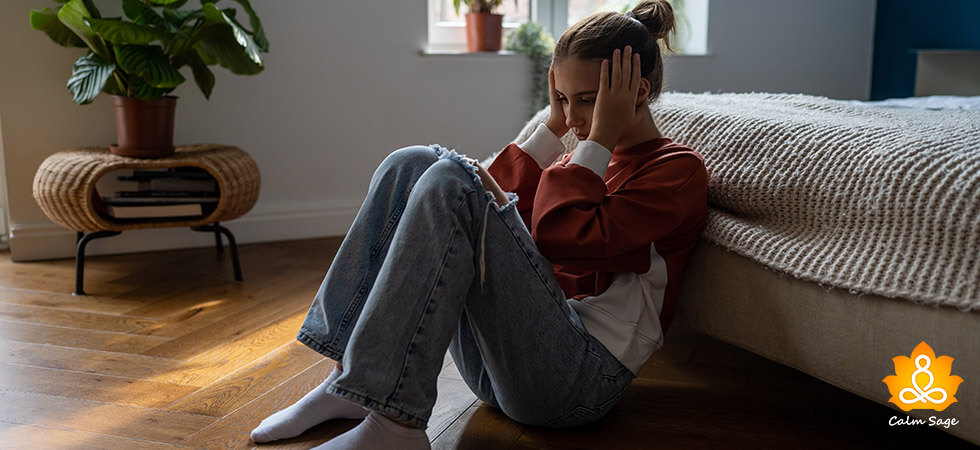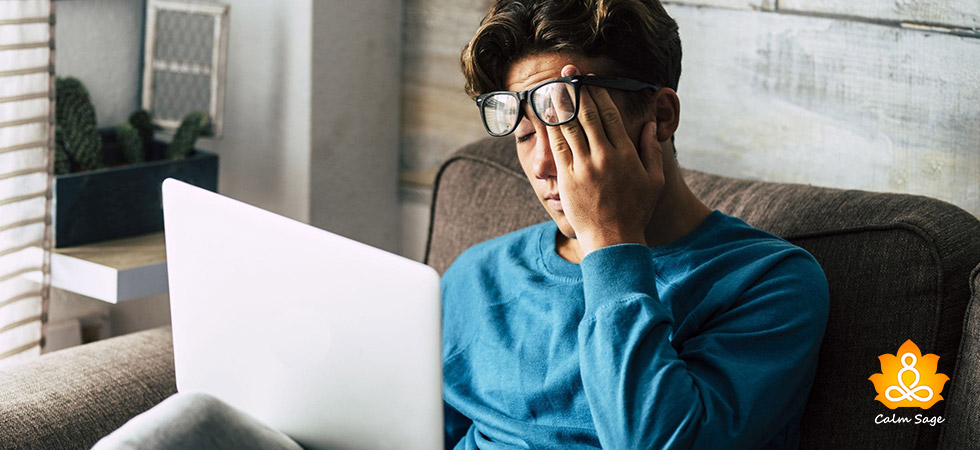The Hidden Anxiety: How to Identify Subconscious Anxiety And Cope With It?

That weird sense of uneasiness, that low-grade simmering tension ready to boil over for no obvious reason, and the general sense of distress that you experience could be a possible sign of subconscious anxiety. Subconscious anxiety is a hidden form of worry and anxiety that can subtly influence your thoughts, actions, and behaviors.
Subconscious anxiety, as the term probably indicates, operates beneath the surface and subtly influences your actions and thoughts. Unlike regular anxiety where clear triggers are present, this hidden form of anxiety can be elusive, making it difficult to diagnose and manage.
In this article, we’re taking a look into this hidden anxiety, its causes, and the tell-tale signs that often go unnoticed. We’ll also look at the ways this anxiety manifests and how you can cope and manage subconscious anxiety to live a calmer and fulfilling life.
Subconscious Anxiety: What Is It?
Subconscious anxiety, also known as low-grade or background anxiety, exists outside our conscious awareness. It’s the state of unease and anxiety that can manifest subtly and impact our mood, behavior, and well-being. In simple terms, subconscious anxiety is when you feel all the symptoms of anxiety but are not aware of them.
Unlike regular anxiety where a clear trigger is present, subconscious anxiety is more like a constant companion.
Here’s an example to help you understand it better;
Imagine beginning your day with a sense of dread or unease, even though there’s nothing wrong that you can see. Maybe you’re constantly on edge, easily irritated, or started. Perhaps you struggle to focus and feel an overwhelming sense of worry, for seemingly no reason.
This is what subconscious anxiety might look like.
What Causes Subconscious Anxiety?
The causes of subconscious anxiety can be quite diverse. From past traumas to unresolved conflicts and from negative childhood experiences to future worries – everything can leave an emotional imprint that might manifest as low-grade anxiety. Social pressures, perfectionism, and a constant need to control everything can also contribute to this hidden anxiety and unease.
Moreover, any changes and shifts in your hormones, brain chemicals, and chronic pain can also worsen the symptoms of subconscious anxiety.
Subconscious Anxiety Symptoms
Let’s look at some common subconscious anxiety symptoms;
- Chronic restlessness: You might feel a constant urge to move or fidget.
- Trouble sleeping: You find it hard to sleep or stay asleep. It’s a common nightly issue these days for you.
- Muscle tension: There’s muscle tension in your neck, shoulders, or jaw without physical exertion.
- Short temper or increased irritability: You find yourself getting easily frustrated and irritated over minor issues.
- Trouble concentrating: Your mind feels foggy, and you can’t focus on your tasks.
- Increased tiredness: You feel constantly drained of your energy, tired, and can’t seem to find any motivation these days.
- Negative self-talk: Your inner voice is always criticizing you and constantly belittles and sows the seeds of doubt in your mind.
- Increase in procrastination: You avoid starting tasks because you feel a fear of failure, or you feel the need to do everything perfectly.
- Increased social anxiety: You feel uncomfortable in social settings, even when you’re among your friends, acquaintances, and familiar faces.
- Unexplained pains and aches: You are experiencing physical aches and pains without any clear medical cause, especially headaches and stomach aches.
Other physical symptoms of subconscious anxiety can include;
- Rapid heart rate or heart palpitations
- Shortness of breath
- Upset stomach
- Dizziness, nausea, or lightheadedness
- Sweating or getting chills, unexpectedly
These symptoms of anxiety can be alarming, causing you to feel physical sickness. Addressing the underlying subconscious anxiety can alleviate these symptoms.
Being Conscious About Subconscious Anxiety…
Knowing what subconscious anxiety is can help you take control of the narrative. Being conscious of subconscious anxiety can help you manage your symptoms and emotions more effectively, for one. Secondly, by acknowledging the hidden anxiety symptoms, you can address the root cause of your stress and reduce it from there.
Moreover, self-awareness can foster a sense of understanding and acceptance of your emotional state, leading to better self-compassion. Taking control of your anxiety narrative can also help boost your self-confidence in bouncing back from distress.
How to Overcome Subconscious Anxiety?
Here are some ways you can overcome and cope with subconscious anxiety;
1. Cognitive-Behavioral Therapy (CBT)
CBT can help you identify and challenge negative thought patterns that contribute to anxiety. A therapist can help guide you in reframing these thoughts and replacing them with more positive and realistic ones.
2. Regular Exercises
Regular physical activity can be a good stress reliever and mood booster. Choose some activities you enjoy – whether it’s a brisk walk in the park, yoga, or dancing. Anything that can help you release stress and anxiety.
3. Sleep Well
I know this advice might sound boring, but trust me when I say that sleeping well helps. Quality sleep can help you reduce stress and alleviate signs of anxiety. Have a regular sleep schedule, create a bedtime routine, and make sure your bedroom is suitable for quality sleep.
4. Practice Relaxation Techniques
Exercises like progressive muscle relaxation, guided imagery, and spending time in nature can help you reduce stress and anxiety, and promote relaxation. You can add deep breathing, mindfulness, and even journaling to your routine to reduce anxiety symptoms.
5. Connect With Loved Ones
Having supportive relationships with friends, family, and even a therapist can help you find support when you don’t know what to do about your anxiety. Emotional support and understanding from support systems can provide a buffer against anxiety, even subconscious anxiety.
6. Limit Alcohol and Caffeine
Again, this might sound like boring advice, but limiting alcohol and caffeine intake can help you reduce anxiety symptoms. These substances can worsen your anxiety symptoms, so opt for healthier alternatives such as herbal tea or water.
7. Explore Alternative Therapies
If you wish, then you can consider other options such as acupuncture, massage therapy, or aromatherapy to cope with subconscious anxiety symptoms. These alternative therapies can offer additional relaxation and stress relief.
Getting Help…
While self-help strategies can help, seeking professional help can be important in certain situations. If you’re experiencing these signs, then it’s a sign that you need to seek a therapist;
- Your symptoms are severe and interfering with your daily life, making it hard to work, socialize, or function normally
- Your symptoms continue even after self-help and trying different coping mechanisms
- Your symptoms co-occur with symptoms of other disorders and conditions such as depression, panic attacks, etc.
- You are struggling with past trauma that is contributing to your subconscious anxiety symptoms
Seeking professional help does not show or indicate weakness. It’s a sign of strength and self-care. A therapist can offer you tools and resources to help you manage your subconscious anxiety and minimize its impact.
Wrap Up…
Subconscious anxiety might be elusive, but it can be managed and even overcome. By being aware of the tell-tale signs and adopting effective self-care strategies and coping techniques, you can break free from the grip of subconscious anxiety.
Remember, self-compassion, healthy lifestyle choices, and mindfulness practices can help you in your journey towards calmness and well-being. Don’t hesitate to seek professional help if needed. Take charge of your mental health to live your life in joy, peace, and purpose.
Hopefully, this blog helped you understand how to identify and cope with subconscious anxiety. Let us know your thoughts and comments in the section below.
Until next time, take care!




















